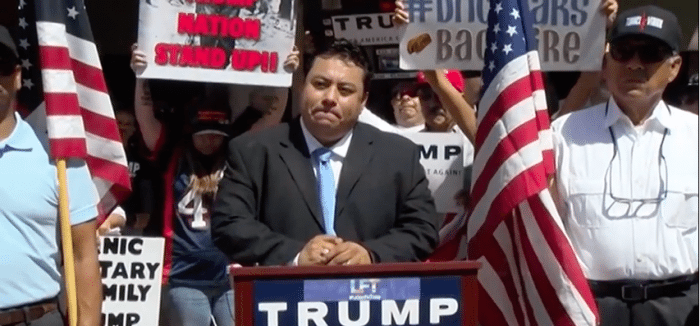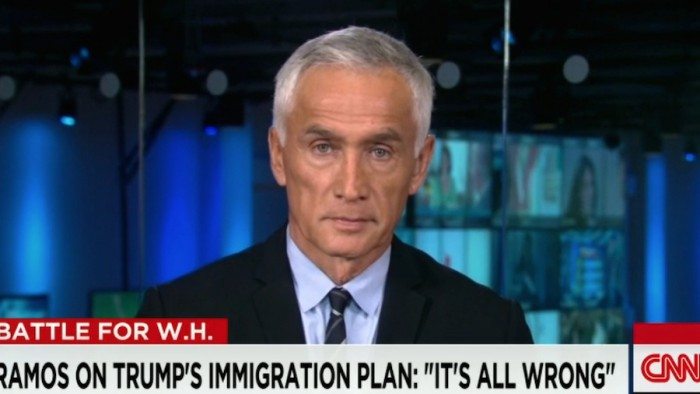Without question, Donald Trump was —to use the words of Evan Osnos of The New Yorker— the “most anti-Mexican presidential candidate in U.S. history.” Although by this point, those of us who have been paying attention have become all too familiar with the catalog of anti-Mexican insults, incidents and proposals associated with the president-elect, this ever-expanding litany of offenses warrants repeating and remembering.
We should, of course, never forget the fact that the Republican candidate launched his campaign by calling undocumented Mexican immigrants “rapists” and “criminals.” He has repeatedly promised to “build a great wall” along the U.S.-Mexico border, and, although it’s difficult to pin down any of Trump’s positions with any precision, he once vowed to force Mexico to pay for the border wall by blocking remittances.
His latest iteration of the proposal, as far as anyone can determine, involves having Mexico somehow “reimburse” the United States for the cost of the wall at some undetermined point in the future. The president-elect has also repeatedly pledged, at least during the campaign, to deport millions of undocumented Mexican immigrants currently residing in the United States, and even proposed the creation of a deportation force reminiscent of the Kristallnacht.
Trump would, of course, return again and again to the anti-Mexican theme that defined his campaign, claiming at one point that Carlos Slim, a Mexican billionaire and the largest individual shareholder in The New York Times, was somehow involved in orchestrating the accusations that had surfaced last October relating to Trump’s alleged sexual misconduct with various women. And, as his campaign appeared to flounder, Trump desperately advanced the false narrative that undocumented immigrants were pouring across the Mexican border to vote in the U.S. election, an absurd and unfounded claim that he recently revived in an attempt to tarnish Hillary Clinton’s victory in the popular vote.
His promise to either renegotiate or altogether withdraw from the North American Free Trade Agreement has rattled nerves in Mexico, a nation that relies upon free trade with the United States for approximately a third of its income. Trump’s hostile posture towards NAFTA, which he once described as “the worst single trade deal ever approved in this country,” has delayed investments in the Mexican economy, and been a factor in the Mexican peso’s unprecedented devaluation. Somewhat predictably, the value of the Mexican peso has displayed an inverse relationship with the president-elect’s political fortunes. As Trump’s prospects waned, the peso’s value increased, and as they rose, the peso declined in value. When the nightmare of a Trump presidency became a reality, the Mexican peso led the decline in currency devaluations among emerging markets, plunging to 9.4% against the U.S. dollar, as the peso suffered its worst devaluation in 20 years.
Jorge Castañeda, Mexico’s former foreign minister and current NYU professor, perhaps summed up the anti-Mexican nature of the Trump campaign best when he noted that for the first time since “Ronald Reagan assailed the Soviet Union in 1980, an American presidential candidate actively campaigned against another country’s national interests.” In this case, however, the country was Mexico, the United States’ second-largest export market, third-largest trading partner, and a perennial ally.
Not surprisingly, much of the anti-Mexican sentiment that has fueled Trump’s candidacy has been directed at Mexican Americans. There’s the time, for example, when Trump unceremoniously kicked Jorge Ramos out of a press conference, and the time Trump maligned a Mexican-American federal judge’s Mexican heritage and “pro-Mexico” political positions.
And, of course, we should never forget the outrages that continue to be committed in Trump’s name by many of his rabid supporters. In what has been referred to by the Southern Poverty Law Center as the “Trump effect,” Trump’s candidacy and his shocking victory in the presidential election have spawned a range of sordid incidents throughout the United States as Trump supporters, emboldened and intoxicated by Trump’s success, feel free to openly voice the vilest of anti-Mexican slurs including things like “build a wall-kill them all” and “Fuck those dirty beaners!” In Wisconsin, Indiana, Iowa, Texas, Oregon, and Michigan, his supporters (or at least those inspired by his toxic anti-Mexican rhetoric) have invoked Trump and the border wall to taunt, harass and intimidate Mexican-Americans and other Latinos.
In Colorado, a woman —perhaps echoing the salient theme of the Trump campaign— unleashed a crude verbal tirade against an unsuspecting Mexican-American mother in front of her children. During the rant, the woman called the mother a “wetback” and yelled “down with Mexicans.” And while I am certainly hoping that I am wrong about this next point, there is a possibility that ugly incidents like this could get even uglier once Trump assumes the presidency.
But despite all of the ugliness associated with the Trump campaign, the most troubling and frankly most baffling aspect of his candidacy has been the support that “the most anti-Mexican presidential candidate in U.S. history” received from within the Mexican-American community itself.
Of course, it is important to acknowledge that the vast majority of Mexican Americans voted for Hillary Clinton in the 2016 presidential election. Although the exact levels of this support are difficult to precisely determine at this point, according to one set of data featured in a Post piece entitled “In Record Numbers, Latinos Voted Overwhelmingly Against Trump. We did the research,” it is possible that in California, Texas, Nevada, Colorado and Arizona, at least 80 percent of Mexican Americans who voted in the 2016 general election voted for Clinton.
Yet while the support Trump received from Mexican Americans certainly shouldn’t be overstated, it was tangible enough to attract some additional attention. Both the Post and the Times, for example, recently published pieces on the unlikely support that Trump received from within the Mexican-American community. The Post article, which focused on Mexican-American support for Trump in the border community of El Paso, Texas, attributed this support to the appeal of certain issues, like opposition to illegal immigration and abortion, or to the nebulous belief that Trump will somehow bring jobs back to America. The Times article similarly profiled Yuma County in Arizona, a largely Mexican-American community located along the U.S.-Mexico border that Trump apparently won by a single percentage point. Once again, the article attributed this support almost exclusively to Trump’s “pledge to create more jobs, lift wages and increase opportunities.”
At first glance, it seems easy to dismiss these two articles as simply much ado about nothing, given the levels of support that Trump actually received from the Mexican-American community. Even the analysis being advanced in these articles somehow seemed superficial and inadequate. It was difficult to accept the proposition at face value that the appeal of Trump’s position on certain issues —namely opposition to immigration, vague promises of economic development, and even opposition to abortion— were compelling enough to convince Mexican Americans to support such an openly antagonistic candidate.
And while I admittedly have no recourse at this point to empirical evidence that would validate my particular conclusions, my instincts and experience tell me that a more incisive analysis of this Mexican-American support for Trump would have revealed that, at best this support reflected an alarming ignorance in its most denotative sense and that at worst, this support could perhaps be understood as some strain of Mexican self-hatred. In the first scenario I contemplated, Mexican-American Trump supporters simply failed to recognize the not-so-subtle implications of a Trump presidency, not only for Mexico but for the Mexican-American community.
They were apparently oblivious to the fact that border communities like El Paso, with its extensive economic connections to Mexico, would be adversely affected on so many levels by Trump’s proposals to renegotiate or withdraw from NAFTA. Maybe they didn’t understand that Trump has proposed draconian border security measures that, if implemented, could devastate the agriculture industry in places like Yuma. Or maybe, as the Times article explained, these Mexican-American Trump supporters were naively hoping that “he did not mean everything he said during the campaign” and would not follow through on his threats. These supporters perhaps weren’t aware of Trump’s denigrating exchanges with Ramos and Judge Gonzalo Curiel, and of the range of incidents all over the country in which Mexican-Americans and other Latinos had been targeted and harassed by Trump supporters.
And they were apparently also unfamiliar with Stephan Bannon, the far-right hate site Breitbart, and the well-documented connection between white nationalism and President-elect Trump. In short, in the first somewhat more benevolent scenario I contemplated, Mexican-Americans who supported Trump simply didn’t realize, for whatever reason, that it was antithetical to their interests to support Trump.
However, another somewhat more complicated and certainly more troubling scenario also occurred to me as I attempted to understand the reasons why Mexican Americans might support a candidate so openly hostile to their interests and identity. It involves a concept known as ethnic self-hatred, a baffling phenomenon that has been explored by Dr. Sander L. Gilman in his book Jewish Self-Hatred: Anti-Semitism and the Hidden Language of the Jews. Although Gilman explored ethnic self-hatred in the context of the Jewish experience, he acknowledged that the constructs he has proposed are “representative” and “universal,” and could be applied to explore other instances of ethnic or racial self-hatred. As explained by Gilman, self-hatred results from the acceptance by an ethnic or racial “outsider” of the negative image of themselves generated by a particular reference group. According to Gilman, in an attempt to “escape the cloak of Otherness” and be accepted by this reference group, the ethnic or racial outsider embraces “the values, social structures and attitudes of this determining group.”
In the context of Mexican-American support for Trump, it certainly seems plausible that many Mexican Americans, when confronted with the virulent anti-Mexican sentiment being spouted by Trump and his supporters, were attempting to cloak their “Otherness” or more specifically their “Mexican-ness” by embracing the same anti-Mexican sentiment they sought to avoid. A perfect exponent of this mindset can perhaps be found in Marco Gutiérrez, a Mexican-American activist and founder of Latinos for Trump. Gutiérrez rose to fleeting prominence (or perhaps more accurately, notoriety) last September when he, echoing one of the central claims of the Trump campaign during an interview on MSNBC, warned that if something wasn’t done about undocumented immigration from Mexico, the U.S. would soon “have taco trucks on every corner.”
It would be a mistake to regard this Mexican American support for Trump as some sort of innocuous and fleeting anomaly. This vulnerable mindset could potentially be exploited, expanded and used to legitimize anti-Mexican policies and attitudes emanating from the Trump administration. It could also be used to further drive the narrative of division between Mexican-Americans and Mexican nationals. Although there may be ways of mitigating the ignorance at the root of this misguided support, dealing with the complex phenomenon of Mexican self-hatred presents a somewhat more daunting proposition. What is abundantly clear though is that the Mexican-American community can no longer afford to simply ignore this problem. As it prepares to confront the increasingly anti-Mexican political climate that the Trump presidency is likely to inaugurate, it is critical for the Mexican-American community to also confront the latent enemy within itself.
***
Nicolás Mena recently founded a non-profit organization called Mexican Americans In Solidarity With Mexico. You can follow him on Twitter @solidaritywmex.





